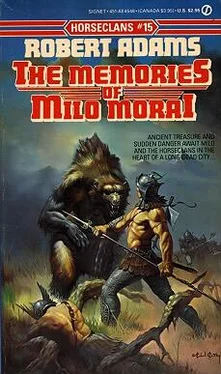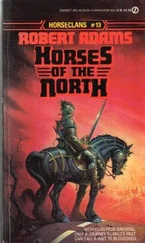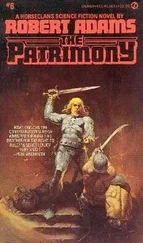“In the beginning, I was able to pick up and converse with a very large number of broadcasts—some of them public, commercial- or government-owned, more privately owned and operated—from them, I learned that old hatreds had flared up into new wars, invasions and rebellions nearly everywhere, with all of the deadly side effects of war—wounds, diseases, starvation, terror. I monitored the prideful, often threatening transmissions of winners and the despairing pleas of losers, I conversed with those who would receive my own transmissions. But then the Great Dyings commenced full-force and worldwide.
“Within the short space of three or four weeks, Wahrn, the numbers of transmitters shrank from thousands to hundreds to scores to dozens. They went on going off the air, a few of them doing so quite abruptly, in the very act of transmitting to me or to others. Near the end of my sojourn in that place, there were no more than a dozen other radios still transmitting and receiving in all of the world, death and« chaos and war having silenced all the rest forever.”
“Why did you leave that place?” beamed Wahrn curiously.
“Part of it was sheer loneliness,” Milo replied. “Funny, but when still large portions of the world were swarming with people in the billions, my plea-sure was to get completely away from the more built-up, more settled areas for a month or two at the time, never missing human companionship at all. But with mankind rapidly declining to the status of an endangered species all over the world, I began to pine for friendly people among whom I could live, with whom I could talk, eat, drink, share the fast-disappearing human experience.”
Mehrdok nodded, beaming, “Yes, I can understand that feeling, Milo. I was a fur trapper, far up to the north and east of here, for three years after I stopped riding as a sword for the traders. That very loneliness is the reason I packed it in and came back here.
“You said that the place was hidden in a canyon. But you had no visitors at all, in all that time?”
Milo grimaced. “No friendly ones, Wahrn. I had had to kill both of the guard dogs in order to get into the house at all—poor beasts, they were only doing the job to which they had been trained. With them dead, I had no warning of intruders until they penetrated to fairly close proximity of the house. But that house had been built with an eye toward defense of it and was more than adequately supplied with firearms, ammunition for them and even items of antipersonnel explosives.
“As you know from my memories, I had been a soldier for a large proportion of my life up until then and I was therefore well versed in techniques of warfare, as I suspected my dead host had been. I used certain of the available materials, in conjuncture with certain others I manufactured—more silent but no less deadly than explosives—to render the only two routes to my hideaway extremely hazardous to any unknowing of just what was just where. The resultant explosions or screams were my early-Warning system. With that system fully operational, very few spoilers ever got as far up the canyon as the house.
“The blasted and burned-out hulks blocking the only real road up the canyon, the charred bodies still within them, these gave firm notice that the road was mined and there were more than a few hideous, frightful surprises awaiting any who tried to come through the woods and brush on foot or on two-wheeled vehicles, too. After each attempted foray, I’d go up and clean and reset the traps, kill any wounded I happened across, then go back to the radio and the pure horror it was receiving.
“I like to feel that I served my dead host well, that I conducted the defense of his property just as he and his family would have done had they remained alive to do it. And when I finally did leave that house, I cleaned it, shut down all of the systems, locked the doors, bolted the shutters and left all of the mines and booby traps armed and ready to repel intruders.
“Into the smallest of the vehicles, I packed arms, ammunition, food, water, extra fuel, bedding and clothing, along with tools and spare parts for the vehicle and the firearms. I thought myself to be well prepared for any eventuality, but—more fool I—it’s wise that I had brought along a backpack, for long before I reached proximity to any living human beings, I struck a deep, water-filled crater in the road surface and wrecked the vehicle far beyond my abilities of any repair. Knowing of old my capacities at load-carrying, I filled the backpack with food, some items of clothing, a pair of boots, most of the gear I’d used to live off the land up in the mountains, plus ammunition and magazines and parts for the weapons I was taking with me. I lashed my sleeping bag and a rolled poncho atop the pack, filled two canteens and snapped them to my weapons belt, slung a rifle and headed northwest, in search of my own kind . . . or, rather, what I then assumed were my own kind; in the long years since, I am become less certain.
“Warily, I mostly kept out of sight of the road, moving cross-country and making wide swings to avoid approaching occupied areas by daylight, prefer-ring to reconnoiter under cover of darkness. It was well that I did so, for I witnessed just what happened to two men who simply walked innocently into small towns and subdevelopments. Those residents who had not been driven at least a little mad by the continuing deaths of all their friends and relatives had been given more than sufficient reason by the spoilers to be murderously wary and suspicious of the motives of any strangers, and their tendencies were to shoot first and ask questions later. Under the severe circumstances, no one—and I least of all—could have blamed them for an excess of caution.
“I was shot twice, from a distance, by persons I never even saw, before I decided that until things calmed down somewhat I would be a great deal safer up in the mountains, with the snakes and the bears, then I would in the stinking charnel house that Southern California was by then become. So I sought out and finally found a two-wheel vehicle which had been designed and built for rugged, off-road work, then I headed back west, into the high country, having had my fill of dying but still deadly mankind for a while.”
The trail bike took Milo fairly far up into the wild mountains before it sputtered to a stop, out of gasoline. At that point, he reshouldered pack, sleeping bag, poncho, weapons and all and began to hike farther up while there still was a bit of daylight remaining to guide him. But he had not gone far when he cut the track, a relatively fresh track, of a party of men, perhaps as many as thirty of them, all shod in Army-issue boots. Keeping to concealment, Milo paralleled the track until it was become too dark to see it easily.
Making no unavoidable noises, he made himself a cold camp, in the heavy brush where he had halted, denying himself even the small luxury of a pipe, this night. But he did force himself to sleep for a couple of hours, after making certain that his L.E.S. 9mm auto was where he could reach it quickly and easily, once more silendy thanking his dead former host for his impeccable taste in firearms.
There was no moon when he awakened, but he had expected none, what with the heavy cloud cover that had blanketed the sky for the latter half of the day just past. He made no move to check his wristwatch—that would have required a brief light which, even if it did not betray his presence and position, would destroy his ability to make his way in the darkness for some time. He stripped himself of every nonessential, along with anything that might impede his progress through heavy brush, make a noise at an inopportune time or reflect light. As weapons on this patrol, he retained only the Colt M1911A1 automatic pistol—it did not hold the eighteen 9mm rounds of the L.E.S., but he knew damned well that any man he hit with one of the fat .45 caliber rounds would go down, and that that was not only always the case with the lighter 9mm—a couple of spare magazines for it, a big Randall fighting knife and a small, double-edged Russell boot-knife. Everything else he laid beside the pack, arranged the camouflaged sleeping bag over all, then tossed brush and leaves over that. Using the edges of his bootsoles, he scuffed down to the dirt, urinated there, then smeared the resultant mud onto his forehead, cheekbone lines, chin and the bridge of his nose. That all done, he kicked the leaves back over the wet spot. He now was ready to seek out the men he had been trailing, for better or for worse.
Читать дальше












